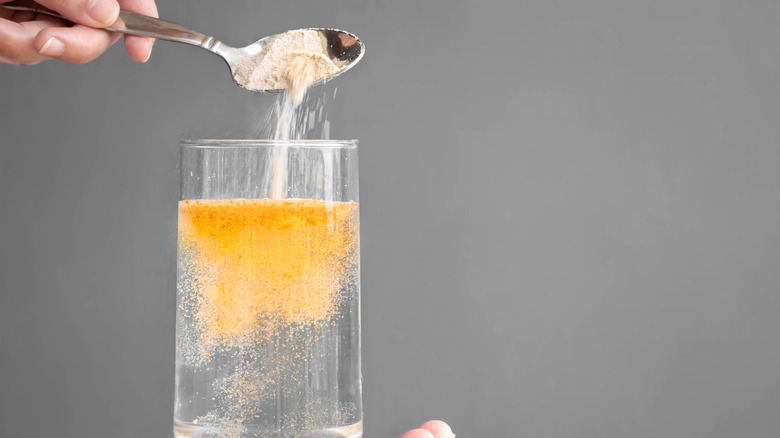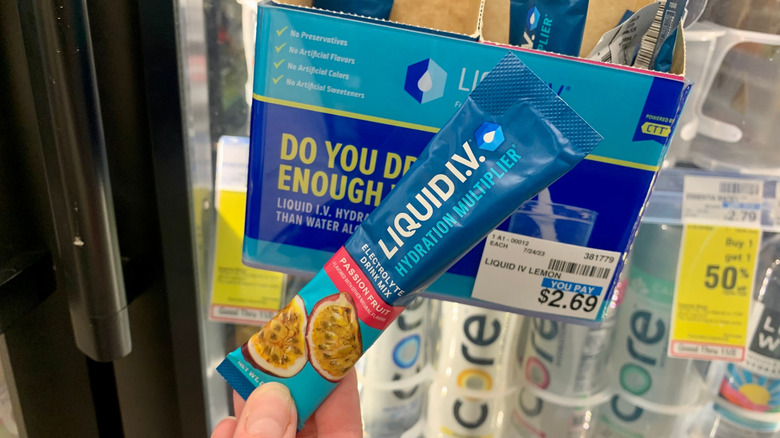Drinking Too Much Liquid IV Can Have A Dangerous Effect On Your Heart
You've heard countless times about how you should drink more water. If you're not a big water drinker, it can be difficult to get your recommended eight or so glasses a day. On the other hand, drinking too much water can be harmful because it dilutes the sodium in your blood and causes swelling in your cells.
Enter electrolyte drinks such as Liquid I.V. Liquid I.V. has the electrolytes sodium and potassium to help balance the fluid levels in your body while supporting your muscles and nerves. While adding a stick of Liquid I.V. to a glass of water can help meet your hydration needs, you don't want to put Liquid I.V. in all the water you drink since it could be too much of a good thing.
How drinking too much Liquid I.V. affects your heart
Although Liquid I.V. provides 8% of your recommended potassium for the day, you're also reaching 21% of your sodium limit. Drinking a serving of Liquid I.V. isn't necessarily harmful because your kidneys will get rid of any excess electrolytes.
If the concentration of electrolytes in your water is too high, however, you run the risk of overwhelming your kidneys. Because most Americans get plenty of sodium in their diets, you could easily overload your body with sodium by drinking too much Liquid I.V. That excess sodium can lead to high blood pressure. It could also cause seizures or a coma. Too much potassium without sufficient water could damage your heart or increase your risk of heart attack. Too many electrolytes can also cause confusion, headaches, and an irregular heart rate. (Read about how to prevent an imbalance of electrolytes in your body.)
How and when to use sports drinks
Athletes and people who work in excess heat can easily get dehydrated because they lose water and electrolytes, particularly sodium, through their sweat. Some people might also need electrolytes if they're already dehydrated or losing water through diarrhea. It makes sense for them to consume drinks with electrolytes to help replenish what they have lost. However, unless you're sweating a lot or have diarrhea, most people don't need to drink electrolyte drinks such as Liquid I.V. You can get the main electrolytes such as sodium, potassium, magnesium, and calcium through your food.
If you're a regular exerciser, the American Heart Association says you probably don't need to resort to a sports drink like Liquid I.V. unless you're working out at a high intensity for more than 75 minutes. Liquid I.V. has 11 grams of added sugar, which is helpful during hard exercise but not helpful for your heart. The American Heart Association advises limiting your added sugar intake to 6% of your daily calories. For a 2,000-calorie diet, that's just 30 grams of sugar.
Even though Liquid I.V. boasts having three times more electrolytes than other sports drinks, that's not necessarily a good thing. Those electrolytes need plenty of water to maintain the proper balance in your body. A 20-ounce bottle of Gatorade G2 sports drink has about the same amount of calories but just 78 milligrams of potassium (2% of your daily value) and 276 milligrams of sodium (12% of your daily value). Don't feel you have to toss out your Liquid I.V., though. Rather than put a stick of Liquid I.V. in a 20-ounce water bottle, add one to 60 ounces of water. That way, you're adding a little bit of taste to your water without overwhelming your system with electrolytes and sugar.


